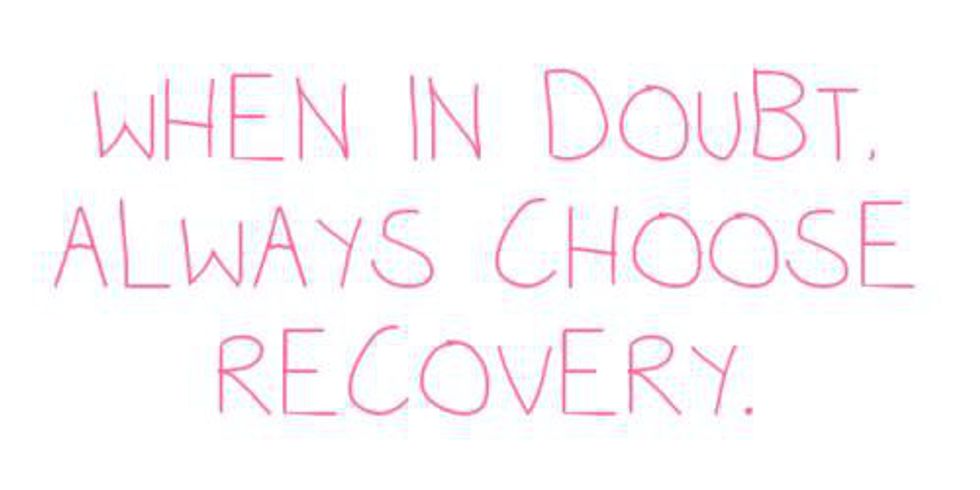For all of us who have had eating disorders, we know the constant fight against it, day in and day out. My therapists and doctors always told me that it will be a lifelong battle, and that the thoughts and struggles will always be there. I never wanted to believe them. I wanted to choose recovery once and then never hear Ed’s voice ever again (Eating Disorder: oftentimes personified into Ed to help separate eating disorder thoughts from your own thoughts.) They said that recovery is learning how to silence Ed, and when he is loud, ignore him without acting on his demands. I would soon find out that not only is recovery choosing to ignore the taunting thoughts that having an eating disorder plagues your mind with; but that it is a daily choice, one that I’ll have to make every single day for the rest of my life.
How Eating Disorders Linger After Recovery:
What many people with eating disorder pasts don’t know is that there are many common traits that a lot of us have or develop later in life after recovery. Even if you aren’t acting on eating disorder behaviors anymore, there are still characteristics related that you might be experiencing. Oftentimes, as we get further away from that point of recovery, we don’t identify these things as being related to our eating disorders at all. For example, in a book titled “Gaining: The Truth About Life After Eating Disorders” Aimee Liu describes “how people with certain personality characteristics or tendencies are not only more prone to developing eating disorders, but that these characteristics can remain problematic throughout one’s life."
Some of these characteristics are perfectionism, avoidance, social isolation, fear of intimacy, and disconnection from one’s self.
This is to say that eating disorders are really sneaky. Even after you think you’ve won, it’ll manifest in other areas and in different ways, and sometimes so well that you don’t even know it. Your eating disorder may still have control over your life. It may be stronger than you realize. You may not look like you have an eating disorder. You may have stopped all Ed behaviors (you should still be very, very, proud of yourself for this.) But, are you constantly aware of your body- your weight and what you eat? Do you still avoid any situation that may pressure you to eat a fear food? Do you scan the room to see if you’re the biggest one there? Do you look in the mirror and feel a sudden overwhelming hatred for your own skin? Or avoid the mirror completely? Do you secretly feel accomplished when you accidentally go all day without eating, even though you know it’s not healthy? Are you constantly trying new fads and diets and workout plans? Do you avoid physical contact—pull away instinctively?
While reading those, did you think, well, I eat a normal amount and healthy food, what’s wrong with that? Working out is good. Caring about your appearance is good. I weigh more than I should, so I can’t have an eating disorder anymore. That was a thing of my past. So, Ed has never really left the building. But that’s not new news, is it? That is what the doctors and therapists have said from the beginning. That this doesn’t go away- that you have to be vigilant and aware.
That has been the hardest thing for me to swallow. Because Ed has really enjoyed these past few months with me, and when I realized it, I was shocked. I don’t look like I have an eating disorder. That was a thing of my past. How did I miss the signs? How did I forget to separate my thoughts from Ed thoughts?
When You Start Slipping--Catching Yourself Before a Relapse
I suddenly found myself trying to remember what choosing recovery even looked like when I did it three years ago. I shut it out—closed the door and hoped that throwing away the key meant the monster could never get out again. It doesn’t work out that way, unfortunately. As it turns out, that is one of the most dangerous things you can do if you want to hold on to recovery. But, that isn’t to say that people haven't silenced Ed so much that they barely notice him. That they go years without even hearing him make a peep. I can have that. You can have that.
If you are someone who is slipping back into old eating disorder habits, don't fool yourself into believing that you can or will maintain control. You lose it so fast. Start to practice separating your thoughts from eating disorder thoughts. Start to be aware of when and where the monster is roaring the loudest—stress and toxic relationships/situations can trigger Ed's grip on your life. Remember that Ed is always wrong. He is always lying, always.
Here are some things that I am going to do to get Ed's voice silenced and my thoughts loud and clear, that you can do as well:
Read the book “Gaining: The Truth About Life After Eating Disorders” https://www.amazon.com/Gaining-Truth-About-Eating-Disorders/dp/B002IT5OXO
Find a therapist that specializes in Eating Disorder Recovery. Boise Area:
Pull out those old recovery tactics (even the ones that seem arbitrary)
- Make “reason’s to recover” cards and leave them around the house.
- Take yoga classes or mediation
- For some, going back to their treatment meal planning helps structure and regains healthy control over their diet.
- Either throw out your scale, or limit to once a week weigh ins.
If you are acting on eating disorder behaviors again, then these tips are especially helpful. But, most importantly: tell someone.
You must tell someone, you must, even if it's literally the most difficult thing you do up until this moment. I once typed "Ed is taking over again" in the notes of my phone and left it in front of a friend. Simple as that, someone knew, and I didn't have to utter a word. This will be the most important first step.
Now, it’s been over 3 years since I first committed to recovery, and I feel like I’ve lived lifetimes since then. Some days, I don't feel like someone that ever lost myself to an eating disorder. I can feel confident and truly happy, like I was in the photo attached to the article. The choosing gets easier. The silencing and ignoring gets easier. I've learned the hard way that one of the easiest ways to relapse is to stop choosing recovery when the thoughts start creeping up again. Because they never really went away for me, they just go between a dull ache and full force attack. Most likely they will come back for most people with ED pasts. Even if it has been 3, 5,10, or 30 years since your darkest place, when Ed had the most control over your life, you still have to remember that he is there; and know how to take back control again. Remember that it is OK. You are strong and you can overcome this again and again.
Don't throw away the key, don't shut it out. You have to tame it, train it, show it who really has control.






















